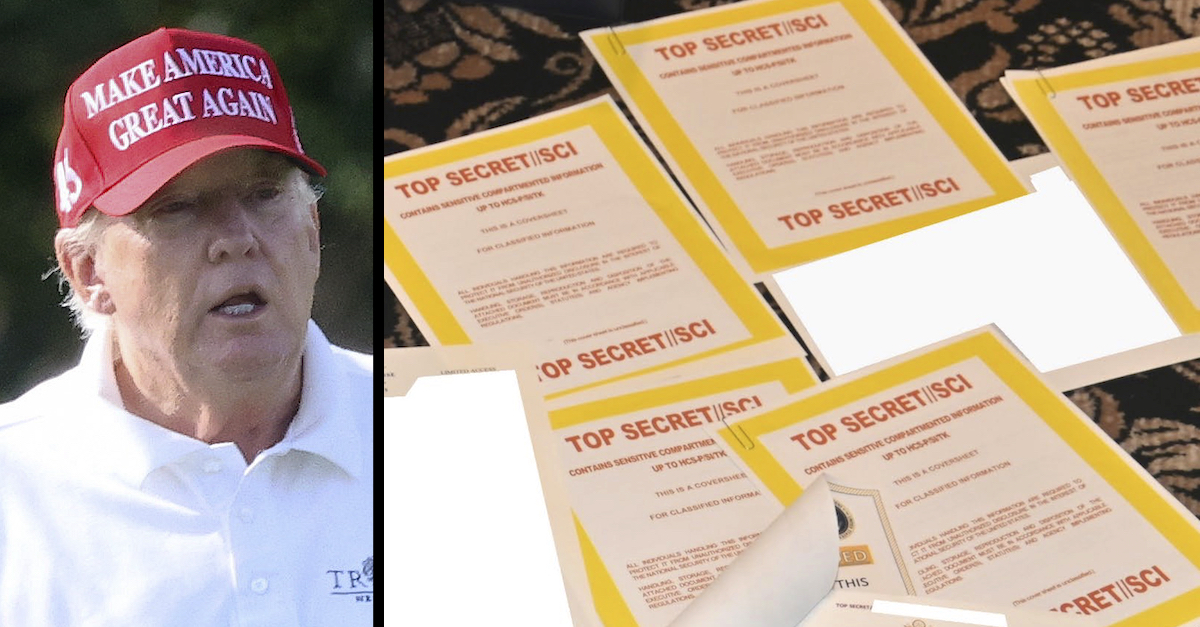
Former President Donald Trump was seen golfing on Sept. 13, 2022. Federal prosecutors filed a photo of documents recovered from Mar-a-Lago in early August 2022. (Photo of Trump by Win McNamee/Getty Images; photo of Mar-a-Lago documents via a federal court filing.)
In the first courtroom match-up for newly anointed special counsel Jack Smith, the Department of Justice urged a conservative panel of the 11th Circuit Court of Appeals to void the privilege review stopping them from using certain files seized from Mar-a-Lago in their investigation against former President Donald Trump.
“Delay is fatal to the vindication of criminal law,” Justice Department attorney Sopan Joshi, on loan from the solicitor general’s office, declared on Tuesday afternoon.
From the general tenor of the roughly 40-minute hearing, that warning resonated: A three-judge panel of all Republican appointees from the conservative 11th Circuit Court of Appeals suggested that a lower court judge may not have had equitable jurisdiction over the case and appeared deeply concerned about the precedent finding in Trump’s favor would set for any subject or target of a criminal investigation.
Time and again throughout oral arguments, Trump’s attorney James Trusty faced sharp questioning from the three-judge panel, even over referring to the search of Mar-a-Lago as a “raid.”
“Do you think that ‘raid” is the right term for execution of a warrant?” U.S. Circuit Judge Elizabeth “Britt” Cagle Grant, a Trump appointee, asked.
Trusty apologized for using loaded terminology, only to earn another rebuke later from a separate panelist — U.S. Circuit Judge William H. Pryor Jr. — for referring to the document authorizing it as a “general warrant.”
“You didn’t establish that it was a general warrant,” Pryor countered.
The exchanges encapsulated the rough reception Trump’s legal team has had in the 11th Circuit since the Justice Department’s appeal began.
In September, the 11th Circuit overruled a portion of U.S. District Judge Aileen Cannon’s order preventing the Justice Department from using hundreds of classified documents in their ongoing investigation of Trump. The FBI found more than 100 documents marked classified up to “Top Secret” and above during the August raid of Mar-a-Lago. Trump is believed to have held onto more than 300 files with classified markings in total. Those are now back in the government’s custody, and Senior U.S. District Judge Raymond Dearie, who is leading the special master review, is not reviewing those files for privilege.
Even Judge Cannon, however, did not find that the government executed its search in “callous disregard” of Trump’s rights.
Judge Pryor said that Trump’s legal team has to live with that record, which might itself torpedo the relief that Cannon granted.
“Your brief doesn’t even attempt to argue that it was satisfied,” Pryor told Trusty.
An 11th Circuit panel — now consisting of Trump-appointed U.S. Circuit Judges Grant and Andrew L. Brasher, and Pryor, a George W. Bush appointee — must now decide the fate of the more than 10,000 of documents without classification markings seized from Mar-a-Lago. That panel is nearly identical to the one that previously ruled in the Justice Department’s favor, except that U.S. Circuit Judge Robin S. Rosenbaum has been replaced by Pryor. Rosenbaum was appointed by Barack Obama.
Special master Dearie is currently reviewing those for attorney-client and executive privileges, and at least for now, prosecutors cannot use the files that have not yet been cleared for their investigation. Prosecutors say that has stymied the department’s investigation, which is now under the purview of Jack Smith. Smith has a history of prosecuting both Republicans and Democrats.
In their written filings, Trump’s lawyers Christopher Kise and Trusty urged the court to maintain the status quo. Earlier this month, they filed a document characterizing the court-authorized search of Mar-a-Lago as an “invasion” and claiming that the perception of fairness required continuing the review.
Judge Pryor, however, remarked that the case appeared to be “indistinguishable from any other pre-indictment search warrant.”
Interrupting Trusty’s attempt to draw a distinction, Pryor said: “Your answer is: There is no difference.”